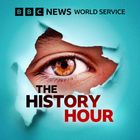
The History Hour
Dec 24, 2022
Max Pearson presents a compilation of this week's Witness History programmes from the BBC World Service.
Sir Trevor McDonald reflects on the BBC's first black producer, Una Marson, and her legacy in the development of the BBC Caribbean Service.
Also, how the BBC managed to broadcast through the Iron Curtain, Colombia's false positives scandal and the incredible rescue of 33 miners trapped in Chile.
(Photo: Sir Trevor McDonald. Credit: BBC)
Contributors: Sir Trevor McDonald, Una Marson, Debbie Ransome and Neil Nunes - BBC presenters Bridget Kendall - the BBC’s former Moscow correspondent Peter Udell - the BBC's former controller of European Services Jacqueline Castillo - whose brother was a victim of the 'false positives' scandal Dr Aslan Doukaev - university teacher when the first Chechen war started Mario Sepulveda - Chilean mine disaster survivor

